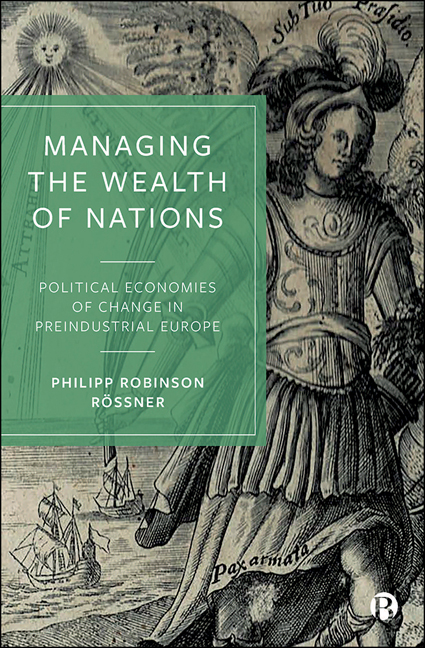Book contents
- Frontmatter
- Contents
- List of Figures and Tables
- Acknowledgements
- 1 Inventing Dynamics: Political Economies of Money, Markets and Manufacturing, 1300s–1800s
- 2 Governing the Future: Capitalism’s Early Modern Temporalities and the Origins of Growth
- 3 The Myth of the Myopic State: Governing Economy and the Politics of Economic Change, 1250s–1850s
- 4 Configuring Free Markets: A Deeper History of Laissez-Faire
- 5 Money and the Rise of Modern Capitalism
- 6 Velocity! Money, Circulation and Economic Development, c.1250–1850
- 7 Creating Wealth: Homo Manufacturabilis and the Wealth of Nations
- 8 Manufacturing Wealth: Industrial Policy and the Rise of the European Economy, 1350–1850s
- Epilogue: State Capacity and Capitalism from Cain to Keynes: Money, Markets and Manufacturing
- Notes
- Index
3 - The Myth of the Myopic State: Governing Economy and the Politics of Economic Change, 1250s–1850s
Published online by Cambridge University Press: 17 January 2024
- Frontmatter
- Contents
- List of Figures and Tables
- Acknowledgements
- 1 Inventing Dynamics: Political Economies of Money, Markets and Manufacturing, 1300s–1800s
- 2 Governing the Future: Capitalism’s Early Modern Temporalities and the Origins of Growth
- 3 The Myth of the Myopic State: Governing Economy and the Politics of Economic Change, 1250s–1850s
- 4 Configuring Free Markets: A Deeper History of Laissez-Faire
- 5 Money and the Rise of Modern Capitalism
- 6 Velocity! Money, Circulation and Economic Development, c.1250–1850
- 7 Creating Wealth: Homo Manufacturabilis and the Wealth of Nations
- 8 Manufacturing Wealth: Industrial Policy and the Rise of the European Economy, 1350–1850s
- Epilogue: State Capacity and Capitalism from Cain to Keynes: Money, Markets and Manufacturing
- Notes
- Index
Summary
Prologue: Potatoes, stewardship and kings
Let's begin with a picture (see Figure 3.1).
This is Frederick ‘the Great’ of Prussia (b 1712, r 1740– 86); a king on the road, massively admired during his lifetime (and beyond), in Prussia (and abroad). The painting, albeit not nearly contemporaneous, epitomizes what kingship meant within an early modern political-economic context. Kings were considered, for good and bad, ‘fatherly managers’ of their countries, conceptualized initially as extended kingly households. As ‘the father of his fatherly duty is bound to care for the nourishing, education and vertuous government of his children: even so is the King bound to care for all his subjects’, claimed James VI and I of Scotland and England in The true lavv of free monarchy, a programmatic pamphlet written in the tradition of early absolutism and the divine right of kings. In the present case the king (Frederick) travels across the dispersed Prussian provinces, with only a small entourage, in his likewise proverbial uniform of a common soldier, eagerly enquiring about his subjects’ methods of production. We are obviously talking potatoes; essential for rescuing 18th-century Prussia from the Malthusian trap. This was a not uncommon trope. Across early modern Europe and Asia, emperors were often depicted behind ploughs; in the Chinese case this developed into a full political ritual. During the Middle Ages and early modernity kings and rulers were conceptualized in the political literature as supreme ‘oeconomists’: as managers or stewards of their nations’ wealth; merchants occasionally became described in similar terms, as in Thomas Mun's classic England's Treasure by Foreign Trade (1620/60). The conceptual analogy was deliberate and intended, signifying an increasingly entangled evolution of politics and capital, something also noted in Marx, Capital and modern historians’ narratives of ‘fiscal-military states’. Historically levels of economic wealth seem to have correlated with fiscal capacity, which in turn can be taken as a proxy measure of state capacity. During the early modern age, Prussian state capacity and per capita incomes lagged behind, especially when compared to Sweden or England. Rulers like Frederick tried all they could to be portrayed as omnipresent and omnipotent but were in fact neither.8 In the Holy Roman Empire especially, political powers were decentralized, fuzzy and fragmented.
- Type
- Chapter
- Information
- Managing the Wealth of NationsPolitical Economies of Change in Preindustrial Europe, pp. 47 - 69Publisher: Bristol University PressPrint publication year: 2023



